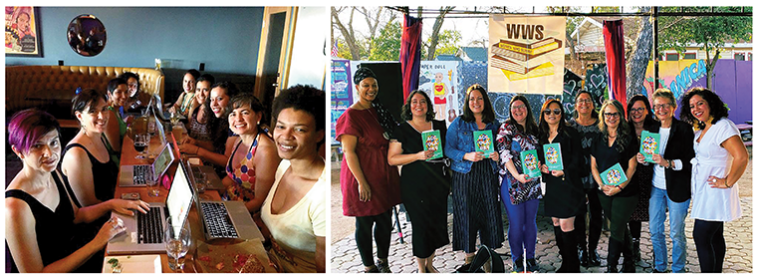For the past decade an international community of women and nonbinary writers have been working to claim space for themselves in an industry historically dominated by men. Known as Women Who Submit (WWS), the group supports and empowers its members to submit their work in spite of publishing’s inequities. Their achievements have been extraordinary: This July, the organization celebrates its tenth year, with twenty-seven chapters across the United States and Mexico, more than one hundred fifty successful book and magazine publication credits by its members in 2020, and a devoted community of writers, editors, and publishers.

WWS members at a submission party in Los Angeles in 2014 (left); WWS members in San Antonio, Texas, (right) in early March 2020. (Credit: Los Angeles: Kenji Liu)
The first meeting of Women Who Submit took place in Los Angeles in 2011, following a discussion among writers and cofounders Alyss Dixson, Ashaki M. Jackson, and Xochitl-Julisa Bermejo about women’s representation in publishing. Dixson had worked with the organization VIDA: Women in Literary Arts, which—among many efforts to diversify literary publishing—compiles statistics regarding gender parity in the publishing industry. That year VIDA released the first of what would become an annual analysis of gender representation in widely distributed literary journals and periodicals. The results were striking: On average only 28 percent of the bylines in the thirteen publications that were the focus of the first study belonged to women. Representation at some publications was as low as 16 percent. Dixson and the other VIDA organizers reached out to the editors of some of the reviewed journals to ask about the editorial gatekeeping that created this inequity and how women and nonbinary writers might push back against it.
“The most common answer was that women don’t submit as often and don’t resubmit as aggressively as men,” says Bermejo. “Alyss, knowing that information, was brainstorming how we could make a difference, and she came up with this idea of a submission party.”
The submission parties, held regularly on Saturdays, began with a small group of women and nonbinary writers who met in family homes and at local restaurants. They encouraged one another to submit and resubmit their work, offering solidarity as they sent their writing off to editors. Soon the parties grew in size and began to take place at larger community spaces in Los Angeles and beyond. Today the meetings, which are free to attend and have migrated online during the pandemic, continue to offer opportunities for writers to share resources, clarify the submission process, and discuss their experiences.
“Every week we have a different facilitator,” says Bermejo. “It has really helped people within the organization understand that the organization isn’t about the leaders—it’s about the people in it and what we all bring to it. We always say that everyone in the organization is a resource. We’re against patriarchal models and hierarchy, so when we’re in a circle it’s never like the leaders are the only ones speaking or have the only answer. Everything is crowdsourced.”
In the past six years the original chapter of Women Who Submit found a more permanent home at the Exposition Park Regional Library in Central Los Angeles and expanded its free public programming to include ongoing workshops and a summer literary conference. A calendar alerts members to upcoming submission deadlines, and a WWS blog publishes members’ essays and interviews. The organization also administers the Ashaki M. Jackson No Barriers Grant, which offers funding to offset submission fees, as well as the Kit Reed Travel Fund for Black & Indigenous Women & Non-Binary Writers, designed to help writers attend a conference, workshop, or other event that will develop their craft. The organization’s first collection, Accolades: A Women Who Submit Anthology (Jamii Publishing, 2020), features forty-two creative works along with testimonies, success stories, and expressions of gratitude from members of Women Who Submit.
Accolades was released on March 4, 2020, a week before the World Health Organization declared the COVID-19 crisis a pandemic. Three days later, the Saturday before schools and businesses were forced to close in Los Angeles and when Women Who Submit was scheduled to meet, the indefatigable group pivoted to online programming. “We actually went online from day one, which I think is unique,” says Bermejo. “It’s wild, but the year 2020 was a huge year of growth for us. We never canceled or rescheduled a thing, so everything we had planned for 2020 still happened; it’s just that everything moved online.”
Today Women Who Submit spans North America, with submission parties in sixteen U.S. states and two countries, coordinated by chapters director Ryane Nicole Granados and the chapter leads. The organization is still growing, and its second anthology, Gathering: Celebrating Ten Years, will be released in December. The book’s editorial team comprises both Women Who Submit leaders and members, to foster leadership and editing skills in the community.
“Thanks to Xochitl-Julisa Bermejo’s leadership and the initiative of our community members,” says managing coeditor Tisha Marie Reichle-Aguilera, “our programming has expanded in the past year despite our inability to gather in person. Gathering is a testament to that perseverance and our ability to continue gathering in the midst of global and personal traumas.”
This same tenacity has almost certainly contributed to a remarkable shift in representation numbers: The 2019 VIDA count estimates 50 percent of the bylines across thirty-nine reputable journals belong to women. While more change is urgently needed—just 1 percent of bylines belong to nonbinary writers, and racial inequities persist—this progress would be impossible without the persistence of writers like those of Women Who Submit. “As a new Los Angeles resident, Women Who Submit gave me the opportunity to grow relationships with other women and nonbinary people in the organization,” poet Muriel Leung writes in Accolades. “I am reminded always that my participation is never passive but one in which leadership is always encouraged. WWS is certainly a model for what we can lean into in the present.”
Thea Prieto is the author of From the Caves, winner of the 2019 Red Hen Novella Award, forthcoming in August from Red Hen Press. Her website is theaprieto.com.








